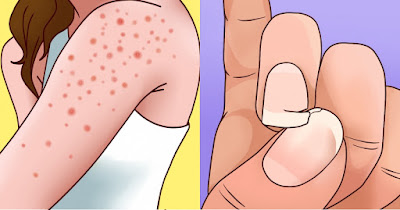What is gluten? It’s the general name for the proteins found in barley, wheat and rye. Doctors call it “the silent killer” because it could cause severe damage to the whole organism.
You right have intolerance towards gluten, but still not be aware of that. Instead of going to the doctor, read this and find out for yourself.
Gastrointestinal problems. Symptoms, such as bloating, diarrhea, lower pain in the abdomen and constipation, could show your intolerance to gluten. These symptoms are frequent for a patient to be diagnosed with IBS – irritable bowel syndrome, but in 25% of these cases, the doctors are usually wrong.
Varying weight that is unexplainable.
You eat properly and exercise and still keep your weight? You might be gluten intolerant! This happens because you might retain water in your organism due to your intolerance to gluten. Another case is a sudden change in your weight, though you’re not doing anything different in particular.
ADHD – attention deficit hyperactivity disorder.
This disorder can happen to the female and male population, such as the adult and children population equally. Sometimes it can be linked to intolerance towards gluten and trying a gluten free diet can cause in reducing the ADHD symptoms.
Poor teeth condition.
You wash your teeth every day, go to the dentist regularly and still have dental problems? You might be sensitive to gluten! If that’s the case, you don’t absorb the necessary element from the food you’re eating, and simply put – you eat in vain. Symptoms such as cavity, tooth decay, enamel etc. can be linked to this phenomena.
Problems with the central nervous system.
Irregular absorption of minerals and vitamins from food can cause inflammation and permeability of the intestines, which furthermore develop symptoms such as anxiety, fatigue, depression and insomnia.
A study also proved that gluten intolerant people tend to have more migraines and headaches than usual. If you eat something with gluten and have a headache after 30 minutes or an hour, there is a 70% chance that you’re gluten intolerant!
Anemia caused from iron deficiency.
Symptoms like lack of breath, feeling fatigue, pale skin and even arthritis are caused by iron deficiency. Such as the poor absorption of other elements, iron is a key element to a variety of foods, and you might not be getting it though you’re eating properly, because you have an intolerance to gluten.
First and most important is to eliminate food that contain gluten, such as rye, bulgur, wheat, flour, semolina and other similar foods. Next, always check the composition of the products you’re baying from the supermarket.
But just to be sure, pay a visit to your doctor to have your blood sample and test it for a 100% result – we don’t want wrong diagnoses!
You right have intolerance towards gluten, but still not be aware of that. Instead of going to the doctor, read this and find out for yourself.
Gastrointestinal problems. Symptoms, such as bloating, diarrhea, lower pain in the abdomen and constipation, could show your intolerance to gluten. These symptoms are frequent for a patient to be diagnosed with IBS – irritable bowel syndrome, but in 25% of these cases, the doctors are usually wrong.
What’s with those hormones?
A direct link between the gluten intolerance and hormonal changes has been proven in the past decade. Hormonal disorders, such as infrequent periods, sleeping disorders and fluctuations in weight are the most common ones. Hormonal disorders and failures are more common for women.Varying weight that is unexplainable.
You eat properly and exercise and still keep your weight? You might be gluten intolerant! This happens because you might retain water in your organism due to your intolerance to gluten. Another case is a sudden change in your weight, though you’re not doing anything different in particular.
ADHD – attention deficit hyperactivity disorder.
This disorder can happen to the female and male population, such as the adult and children population equally. Sometimes it can be linked to intolerance towards gluten and trying a gluten free diet can cause in reducing the ADHD symptoms.
Poor teeth condition.
You wash your teeth every day, go to the dentist regularly and still have dental problems? You might be sensitive to gluten! If that’s the case, you don’t absorb the necessary element from the food you’re eating, and simply put – you eat in vain. Symptoms such as cavity, tooth decay, enamel etc. can be linked to this phenomena.
Problems with the central nervous system.
Irregular absorption of minerals and vitamins from food can cause inflammation and permeability of the intestines, which furthermore develop symptoms such as anxiety, fatigue, depression and insomnia.
A study also proved that gluten intolerant people tend to have more migraines and headaches than usual. If you eat something with gluten and have a headache after 30 minutes or an hour, there is a 70% chance that you’re gluten intolerant!
Anemia caused from iron deficiency.
Symptoms like lack of breath, feeling fatigue, pale skin and even arthritis are caused by iron deficiency. Such as the poor absorption of other elements, iron is a key element to a variety of foods, and you might not be getting it though you’re eating properly, because you have an intolerance to gluten.
I AM GLUTEN INTOLERANT. HOW CAN I TREAT MY CONDITION?
First and most important is to eliminate food that contain gluten, such as rye, bulgur, wheat, flour, semolina and other similar foods. Next, always check the composition of the products you’re baying from the supermarket.
But just to be sure, pay a visit to your doctor to have your blood sample and test it for a 100% result – we don’t want wrong diagnoses!

0 Response to "7 Signs You’re Gluten Sensitive, And This Is Important to Know"
Post a Comment